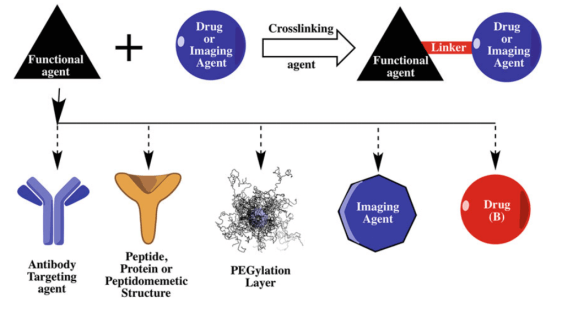Custom Bioconjugation Services
Service Description
BOC Sciences is a leading provider of bioconjugation services focusing on drug development. Over the past decade, we have offered a comprehensive range of hybrid compounds supported by our state-of-the-art technology platform and extensive expertise. From project scope analysis and problem-solving recommendations to complex biopolymer production and analytical development, we succeed with excellence and confidence to meet our customers’ demand for novel bioconjugates that are efficient and cost-effectively.
What is Bioconjugation?
Bioconjugation is a chemical strategy to form a stable covalent bond between two molecules, at least one of which is a biomolecule. Of all biomolecules, proteins are vital substrates for bioconjugation reactions.
Common biochemical conjugation includes:
- Amine coupling with lysine residues
- Mercapto coupling with cysteine residues
- Free radical reaction induced by photochemistry
The most common bioconjugation are:
- Coupling of small molecules, such as linking biotin to proteins.
- Connecting protein to protein, such as antibody-enzyme conjugation.
- Other unusual conjugation molecules include oligosaccharides, nucleic acids, synthetic polymers, polyethylene glycol and carbon nanotubes.
Bioconjugation is a novel technology that improves biological activity from biopharmaceutical aspects and provides spatial and temporal distribution. Moreover, this strategy opens up new prospects for the delivery of drugs, peptides, enzymes, and oligonucleotides. Mechanistically, site-specific delivery can be achieved by tailoring the conjugate to an inactive prodrug and designing a polymer-drug bond that is readily cleaved by a specific enzyme or pH. These prodrugs significantly alter the cell entry mechanism, pharmacokinetic treatment, and ultimately targeted drugs. Bioconjugate drugs include antibody-drug complexes (ADC), PEGylated proteins, siRNA complexes and vaccine complexes.
 Fig.1 Basic diagrammatic representation of a bioconjugates’ design and structure. (Elzahhar P, 2019)
Fig.1 Basic diagrammatic representation of a bioconjugates’ design and structure. (Elzahhar P, 2019)
Bioconjugation Applications
- Biochemical assessment
- Diagnostic application
- Industrial application
Coupled small molecules are used as probes for rigorous biochemical analysis, and non-fluorescent small molecules such as biotin are used as mechanical probes.
Qualitative and quantitative analysis of clinical samples is essential for diagnosing early disease, and the high specificity of antibody-antigen interaction avoids sample purification.
Bioconjugation is used in various industries. For example, isomerized fumaric acid and malic acid are used in the food industry for residue detection; the pharmaceutical industry uses immobilized enzymes for drug synthesis, drug detection, doping detection, etc.
Our Advantages
- Excellent technical support: experienced research team to assist customers from design to delivery
- Comprehensive and proficient bioconjugation technical platform
- Highly reliable and reproducible result
- Data analysis, detailed report with results and discussion
- Quality one-stop services
- Cost-effective
- Convenient ordering and timely delivery
- Meet your specific requirement in research objective, budget, and time
Project Workflow

Quality Services
Our Custom Bioconjugation Services
- Antibody Conjugation Services
- Protein/Peptide Crosslinking
- Oligonucleotide Bioconjugation
- Drug Conjugation Services
- Additional Conjugation Services
- Cholesterol Conjugation
- Peptide Conjugation Services
Frequently Asked Questions (FAQ)
Custom Bioconjugation Services involve the tailored linking of biomolecules such as proteins, antibodies, or nucleic acids to other molecules like drugs, peptides, or fluorophores. These services are designed to meet specific research or therapeutic needs, optimizing the functionality of the conjugates for diverse applications.
Various biomolecules can be conjugated, including antibodies, proteins, oligonucleotides, enzymes, and peptides. These biomolecules are conjugated to other entities such as small molecules, nanoparticles, or fluorophores to enhance their properties or enable targeted delivery.
Custom Bioconjugation is commonly used in drug delivery systems, diagnostic assays, immunoassays, and therapeutic development. It is particularly valuable in creating targeted treatments, improving drug stability, and enhancing the detection of biomolecules in various analytical methods.


References
- Vaidya A; et al. Bioconjugation of polymers: a novel platform for targeted drug delivery. Current Pharmaceutical Design. 2011; 17(11).
- Elzahhar P; et al. Bioconjugation in drug delivery: practical perspectives and future perceptions. Methods Mol Biol. 2019; 2000: 125-182.